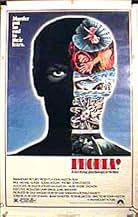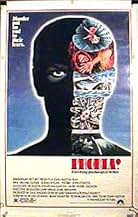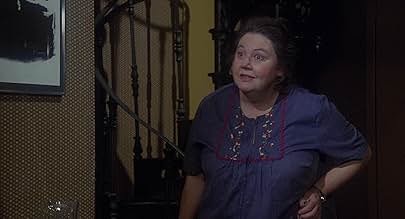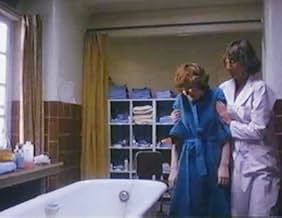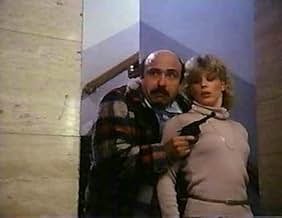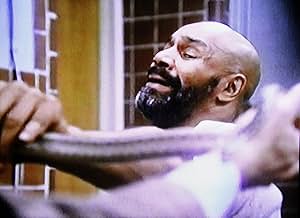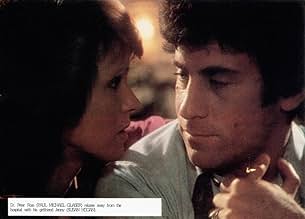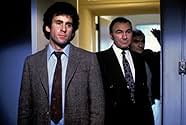Uno psichiatra impegnato in una terapia radicalmente nuova diventa sospettato quando i suoi pazienti vengono assassinati, ciascuno in base alle proprie fobie individuali.Uno psichiatra impegnato in una terapia radicalmente nuova diventa sospettato quando i suoi pazienti vengono assassinati, ciascuno in base alle proprie fobie individuali.Uno psichiatra impegnato in una terapia radicalmente nuova diventa sospettato quando i suoi pazienti vengono assassinati, ciascuno in base alle proprie fobie individuali.
- Regia
- Sceneggiatura
- Star
- Premi
- 2 candidature totali
John Stoneham Sr.
- Security Guard
- (as John Stoneham)
Recensioni in evidenza
During the 1970s, it was not an uncommon sight to have maverick Hollywood director John Huston slumming it out as an actor in often desperate, generic and star-studded international productions like TENTACLES (1977; whose fairly recent viewing did no favors to my childhood memories of it) and THE VISITOR (1979; which, surprisingly, turned out to be a far more satisfying watch than I could have ever imagined); this he did, no doubt, to obtain finance for the more personal of his projects as a director but, after WISE BLOOD (1979) – one of his most acclaimed but commercially unsuccessful latter-day films – he was forced to take the 'safe' course even behind the camera as he followed this in quick succession with three totally routine and impersonal assignments that belied his creative involvement. The first of these was the Canadian horror-thriller under review that boasted some interesting credentials: writers Jimmy Sangster (the doyen of Hammer Films' scribes), Gary (RAW MEAT) Sherman and Ronald (ALIEN) Shusett (who probably sold off their original story because they were contemporaneously shooting the superior "Video Nasty", DEAD AND BURIED) and actors – TV star Paul Michael Glaser and Canadians John Colicos and Alexandra Stewart.
Glaser had just finished his four-year stint as "Starsky" in the popular cop series and this was his first (and, as it happened, only) shot at the title of a Hollywood leading man in the movies; he had previously only had supporting roles in films like FIDDLER ON THE ROOF (1971) and, after this non-starter, he would concentrate his efforts on directing – mostly for TV but also one of Arnold Schwarzenegger's more notable star vehicles, the Sci-Fi actioner THE RUNNING MAN (1987). Glaser plays a shrink with a novel and radical technique of confronting phobics head-on with their fears in his 'treatment' room but, given the experimental nature of it, his patients so far are 5 convicted criminals. Before long, they start getting knocked off: agoraphobic Stewart, traumatized by her 'cure' of spending some time in a densely-populated train station, runs to find comfort in Glaser's apartment – only to be blown away by a booby-trapped drawer(!); a nerdy war veteran, suspected by bullying Detective Colicos of this foul play, goes nuts in the police station and dashes off to a place high up in a nearby building site to test his acrophobia by leaping to his death (despite the last-minute counsel of Glaser – who is forever being interrupted during his extra-curricular activities to tick off another patient off his list!); a frigid girl, subjected to footage of a gang rape by the friendly doctor, needs to wash off that filthy feeling presto and is, inevitably, drowned in the bathtub by a pair of gloved hands; a claustrophobic punkish youth flips out at the news of the latest murder and, eventually, gets crushed in an elevator shaft at the apartment block where Glaser's girlfriend lives; a colored ophidiophobic (a fear with which I admit to be afflicted myself) is bitten by a rattlesnake – despite having been made to finally touch a reptile only a few days before.
Despite the would-be juicy roster of red herring victim-suspects, there are only two viable suspects: one being Glaser's former girlfriend, a fellow psychiatrist who might have every reason to see his new technique fail but, when during a conversation with her replacement in Glaser's empty office, it transpires that the latter was saddled with a guilt complex following his younger sister's death in childhood, the stage is set for a crazed Glaser proudly confessing his part in the murders to his girl and shooting himself in the head right in front of her! The film is often thought of as Huston's directorial nadir but, actually PHOBIA is not as unwatchably bad as some reviewers would have us believe: quite simply, it is just too predictable for a whodunnit, too tame for a slasher movie and Glaser too detached ("magnificently" so, in fact, as per the script!) for the audience to care about his fate. For the record, this viewing came as another belated tribute to the late Jimmy Sangster and, apparently, the premise is awfully similar to the contemporaneous Klaus Kinski shocker, SCHIZOID (which I am not familiar with)...but I did watch Richard Rush's even more maligned COLOR OF NIGHT (1994) fairly recently and, all in all, that oversexed later film was an understandably more enjoyable ride than the Huston film proved to be!
Glaser had just finished his four-year stint as "Starsky" in the popular cop series and this was his first (and, as it happened, only) shot at the title of a Hollywood leading man in the movies; he had previously only had supporting roles in films like FIDDLER ON THE ROOF (1971) and, after this non-starter, he would concentrate his efforts on directing – mostly for TV but also one of Arnold Schwarzenegger's more notable star vehicles, the Sci-Fi actioner THE RUNNING MAN (1987). Glaser plays a shrink with a novel and radical technique of confronting phobics head-on with their fears in his 'treatment' room but, given the experimental nature of it, his patients so far are 5 convicted criminals. Before long, they start getting knocked off: agoraphobic Stewart, traumatized by her 'cure' of spending some time in a densely-populated train station, runs to find comfort in Glaser's apartment – only to be blown away by a booby-trapped drawer(!); a nerdy war veteran, suspected by bullying Detective Colicos of this foul play, goes nuts in the police station and dashes off to a place high up in a nearby building site to test his acrophobia by leaping to his death (despite the last-minute counsel of Glaser – who is forever being interrupted during his extra-curricular activities to tick off another patient off his list!); a frigid girl, subjected to footage of a gang rape by the friendly doctor, needs to wash off that filthy feeling presto and is, inevitably, drowned in the bathtub by a pair of gloved hands; a claustrophobic punkish youth flips out at the news of the latest murder and, eventually, gets crushed in an elevator shaft at the apartment block where Glaser's girlfriend lives; a colored ophidiophobic (a fear with which I admit to be afflicted myself) is bitten by a rattlesnake – despite having been made to finally touch a reptile only a few days before.
Despite the would-be juicy roster of red herring victim-suspects, there are only two viable suspects: one being Glaser's former girlfriend, a fellow psychiatrist who might have every reason to see his new technique fail but, when during a conversation with her replacement in Glaser's empty office, it transpires that the latter was saddled with a guilt complex following his younger sister's death in childhood, the stage is set for a crazed Glaser proudly confessing his part in the murders to his girl and shooting himself in the head right in front of her! The film is often thought of as Huston's directorial nadir but, actually PHOBIA is not as unwatchably bad as some reviewers would have us believe: quite simply, it is just too predictable for a whodunnit, too tame for a slasher movie and Glaser too detached ("magnificently" so, in fact, as per the script!) for the audience to care about his fate. For the record, this viewing came as another belated tribute to the late Jimmy Sangster and, apparently, the premise is awfully similar to the contemporaneous Klaus Kinski shocker, SCHIZOID (which I am not familiar with)...but I did watch Richard Rush's even more maligned COLOR OF NIGHT (1994) fairly recently and, all in all, that oversexed later film was an understandably more enjoyable ride than the Huston film proved to be!
A psychiatrist's (Paul Michael Glaser) patients are being killed using their own phobias. Who's doing it...and why? Well...the tag line of the movie gives away the entire plot! I caught this mess back in 1981 on cable TV LATE at night. I watched it because I was bored and love horror movies. Well...it WAS horrible! For one thing Glaser (who can be good) walks through his role like he's on Valium. The murders aren't even well-done and the identity of the killer is very obvious from the very beginning.
You really got to wonder why John Huston picked this to direct. He's good at dramas--not psychological horror films. Whenever he tried to direct something different it was always a disaster. Remember--he directed "Annie" which is considered one of the worst musicals put on film. In this one he seems unsure of how to shot a suspenseful scene or pace the film. This is dragged out and very very dull.
This is basically a forgotten film--let's hope it stays that way! Even Glaser said this was terrible. A 1 all the way.
You really got to wonder why John Huston picked this to direct. He's good at dramas--not psychological horror films. Whenever he tried to direct something different it was always a disaster. Remember--he directed "Annie" which is considered one of the worst musicals put on film. In this one he seems unsure of how to shot a suspenseful scene or pace the film. This is dragged out and very very dull.
This is basically a forgotten film--let's hope it stays that way! Even Glaser said this was terrible. A 1 all the way.
I think this movie is slightly underrated. In no way is it a great film, but for a low budget thriller it's okay. It's interesting to see the different kinds of phobias and the film does leave you guessing as to what's really going on. The storyline is a little slow and can drag on at times, but there's also enough in there to keep you interested. The filming is of a poorer quality; I was watching the blue ray version and it's still very fuzzy; my black and white films have better quality then this one. If your a big fan of lower budget horror films then why not give this one a try! If your looking for something scary and extremely entertaining, I wouldn't recommend this film.
This certainly is not a great thriller (and it never aspired to be), but if you like low-budget B-movies, then you're likely to agree that it isn't THAT bad, either. I happen to think that all whodunits are inherently interesting if they're executed with at least a minimum level of competence, and "Phobia" was directed by the legendary John Huston himself! Far from his best work, yes, but he managed to keep my attention. The "surprise" ending, though, is predictable. (**)
Paul Michael "Starsky" Glaser is Dr. Peter Ross in this routine psycho-thriller, which is treated as *just* a pay check movie for the majority of the talent assembled. Certainly nobody brings any real passion or creativity to this script. The script is really not so hot, which is too bad considering that some of the writing talent involved included Ronald Shusett ("Alien") and Hammer scribe Jimmy Sangster ("Horror of Dracula"). Overall, the film is lacking in suspense and a truly good story, although the idea of mental patients led to their doom through their own phobias *could* have been better realized.
Ross is overseeing a program in which his patients are forced to confront images capturing their anxieties (heights, snakes, etc.). Then, one of them is blown to kingdom come by an explosive device left inside Ross' own apartment, and this leads to a rash of murders as the cops on the case (John Colicos, "The Changeling", and Kenneth Welsh, "The Day After Tomorrow") cast a suspicious eye on everyone in the therapy group.
Glaser is miscast in the lead and not very good, although the presence of Colicos & Welsh, and the appealing Susan Hogan ("The Brood") as Ross' girlfriend does help matters. Colicos and Welsh play "bad cops" who go out of their way to intimidate the nebbishy Henry (David Bolt, "Videodrome"). Co-starring are Patricia Collins ("Lost and Found"), David Eisner and Lisa Langlois from "Happy Birthday to Me", Robert O'Ree (David Cronenbergs' "Rabid"), Alexandra Stewart ("Frantic"), Neil Vipond ("Kings and Desperate Men"), and Marian Waldman (Mrs. Mac in the original "Black Christmas").
All of this is adequately entertaining at best, leading to a supposed "twist" ending that isn't exactly hard to figure out. Even this finale is executed with a certain lack of zeal.
There *are* worse thrillers out there, to be sure, but people may wonder why Huston would spend (some would say waste) his time filming such a script. At least his name in the credits ensures a definite curiosity value.
Five out of 10.
Ross is overseeing a program in which his patients are forced to confront images capturing their anxieties (heights, snakes, etc.). Then, one of them is blown to kingdom come by an explosive device left inside Ross' own apartment, and this leads to a rash of murders as the cops on the case (John Colicos, "The Changeling", and Kenneth Welsh, "The Day After Tomorrow") cast a suspicious eye on everyone in the therapy group.
Glaser is miscast in the lead and not very good, although the presence of Colicos & Welsh, and the appealing Susan Hogan ("The Brood") as Ross' girlfriend does help matters. Colicos and Welsh play "bad cops" who go out of their way to intimidate the nebbishy Henry (David Bolt, "Videodrome"). Co-starring are Patricia Collins ("Lost and Found"), David Eisner and Lisa Langlois from "Happy Birthday to Me", Robert O'Ree (David Cronenbergs' "Rabid"), Alexandra Stewart ("Frantic"), Neil Vipond ("Kings and Desperate Men"), and Marian Waldman (Mrs. Mac in the original "Black Christmas").
All of this is adequately entertaining at best, leading to a supposed "twist" ending that isn't exactly hard to figure out. Even this finale is executed with a certain lack of zeal.
There *are* worse thrillers out there, to be sure, but people may wonder why Huston would spend (some would say waste) his time filming such a script. At least his name in the credits ensures a definite curiosity value.
Five out of 10.
Lo sapevi?
- QuizGladys Hill, for years John Huston's personal assistant and co-writer, contributed greatly to the preparation of the final shooting script for Phobia uncredited. She was given a credit as "assistant to Mr. Huston".
- Citazioni
Dr. Peter Ross: [to Jenny] I'm not going to spend the rest of my life in a chemical straight jacket!
- ConnessioniFeatured in The Color of Fear with Susan Hogan (2019)
I più visti
Accedi per valutare e creare un elenco di titoli salvati per ottenere consigli personalizzati
- How long is Phobia?Powered by Alexa
Dettagli
Botteghino
- Budget
- 5.100.000 USD (previsto)
- Lordo Stati Uniti e Canada
- 59.167 USD
- Lordo in tutto il mondo
- 59.167 USD
Contribuisci a questa pagina
Suggerisci una modifica o aggiungi i contenuti mancanti


